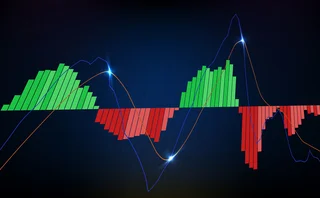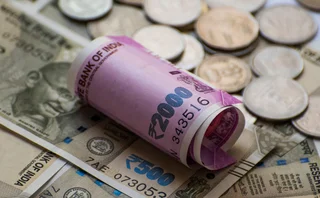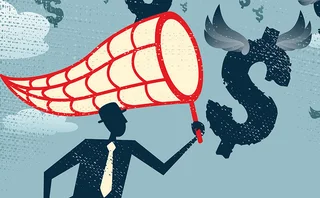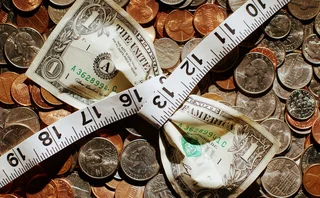
Reversal of fortunes
Reverse convertibles have been the mainstay of private banking for four years, with notes referenced to baskets of financials particularly popular. But with bank stocks plummeting, a number of these products have redeemed into the shares of the worst performer, causing a sharp slowdown in business. Wietske Blees reports

Private banking clients have been fretfully eyeing events in the equity market since the turn of the year. With stock prices tumbling, billions of dollars of reverse convertibles - hugely popular with high-net-worth individuals - have redeemed into poorly performing shares. Other products have seen their maturities stretched beyond the point anticipated by investors, with no interim payment of coupon. With fewer notes redeeming at par - meaning less money available to be reinvested - dealers are also starting to feel the pain, with some reporting a sharp slowdown in business.
Reverse convertibles come in all shapes and sizes, but most of those launched over the past few years have referenced baskets of stocks, enabling investors to achieve additional pick-up by taking exposure to correlation, as well as volatility. In their most simple form, these products redeem at par with an enhanced coupon so long as none of the stocks fall below a pre-determined barrier - for instance, 75% of their initial level. If any fell below this point, the note would redeem in the shares of the worst-performing stock at the barrier strike.
Further enhancements have been included - in particular, so-called auto-callable features. These products automatically terminate after year one and pay a high coupon if all the stocks are at or above their initial levels. If any of the stocks are below their initial level, the product continues with no payment of coupon until the next observation date - and so on until maturity. If, at maturity, all the stocks are at or above their initial levels, the product redeems at par with an enhanced coupon. If any are below a specific barrier, then the investor is short a knock-in at-the-money put on the worst-performing stock.
Given the perceived stability and record profits of banks over the past few years, financial stocks were popular inclusions in the baskets. That was still the case in the third and fourth quarters of 2007, when the first subprime writedowns caused bank stocks to fall and implied volatilities to soar - in turn, enabling investors to obtain significantly higher coupons than had previously been achievable. "Financial stocks were especially popular after July, when financials underperformed and their volatility increased. Consequently, coupons became very attractive," explains Alberto Cherubini, London-based head of exotic equity derivatives trading for Europe, the Middle East and Africa at Citi.
The problem is that equity markets have fallen sharply since the turn of the year, with the Dow Jones Eurostoxx 50 index sinking 22% between January 1 and March 17. Financials, in particular, have been hit hard. The Dow Jones Eurostoxx financials index, which tracks 79 financial services firms, fell from 443.89 on May 18, 2007 to 282.25 on March 17 this year, a fall of 36%.
Making matters worse is that many of the products sold by Swiss private banks were referenced to baskets that included UBS, Credit Suisse and Swiss Re - all of which have experienced steep drops in their share prices in recent months. UBS, which reported a $12 billion writedown on its portfolio of assets linked to subprime mortgages and a further $2 billion on assets linked to other US residential mortgages in the fourth quarter, has seen a 67.8% drop in its share price between June 1, 2007 and March 17 this year. Other popular names include HSBC - the share price of which has dropped from 946 on October 17, 2007 to 712 on January 28 - and Citigroup, which has seen its share price tumble from $55.20 on May 30, 2007 to $18.62 on March 17.
The effect on outstanding reverse convertibles and auto-callables has been severe. "If one of the underlying stocks underperforms dramatically, the contagion effect can be substantial and it can knock out the capital protection in a whole plethora of products in that market," explains Kieron Launder, head of structured products at the private banking arm of Rothschild in London.
That's precisely what has happened. A sizeable proportion of the reverse convertibles referenced to financial stocks have already redeemed in the worst-performing shares, while auto-callables have failed to terminate, locking in investors' funds until the next observation date. "Roughly two thirds of these barrier reverse convertibles have since knocked in, and many of those containing financial stocks have already been redeemed in the worst-performing underlying stock," says Philip Payer, head of external sales, equity derivatives, at private bank Julius Baer in Zurich.
With investors tied in to existing products, little money is getting reinvested into new reverse convertibles and auto-callables, causing a noticeable slowdown in structured products business among private banking clients. "A lot have knocked in, but the ones that have not knocked-in are not terminating, so the volume being reinvested, which has always been at least 50%, will be substantially decreased this year," says Citi's Cherubini.
That's not to say activity has completely dried up. Some investors have taken advantage of market conditions since February and March to put new trades on, in the expectation that financial stocks are unlikely to fall too far below current levels. With implied volatilities hovering near recent highs, investors can obtain significantly higher coupons than was the case a year ago.
"Coupons have approximately doubled from 12 months ago, meaning a client can either opt to trade under the same terms and benefit from a larger coupon, or retain the coupon they would have received 12 months ago, but move the barrier further down," says Lucia Pelliciolli, head of product development in equity exotics at JP Morgan in London.
Many of the clients putting on new trades are opting for the latter - with some even willing to include UBS, adds Julius Baer's Payer. "Often the coupons are still in the same range as they were before, around 12%, but the barriers are much lower at about 55%. In the past three weeks, we have received many requests for this underlying."
Even for those left holding poorly performing shares, bankers point out there's a chance high-net-worth clients will eventually make back a large part of their losses as stock prices recover. And for those auto-callables that have not terminated, investors still have a chance to receive a high coupon if all the stocks recover to trade above their initial levels by the next observation date. "These clients tend to carefully select underlying names they believe will perform in the long run, so they are not worried about short-term underperformance," claims Pelliciolli. "On the other hand, there is also the feeling that after the recent market sell-off, the risk of a further large downward movement is less likely, and now could be an ideal time to strike a trade."
Indeed, some high-net-worth individuals are putting on trades that will enable them to benefit handsomely from any upturn in financial stocks, say bankers. "On the one hand, there are clients who are happy to hold on to UBS stock in the anticipation that its value will go up again, but there are also clients looking for quicker recoveries. They can use trigger structures or capped outperformance certificates to quickly recoup their losses," notes Payer.
The trigger structure effectively operates as a normal reverse convertible, with the additional feature that if all underlying stocks rise to a predefined level - for instance, 105% - the product will redeem immediately with an enhanced coupon. "During a period of rebound, this level could be reached fairly quickly," adds Payer.
The capped outperformance certificates allow investors to participate over-proportionally in the upside of a stock. This is achieved by implicitly buying additional at-the-money calls on the stock and selling out-of-the-money-calls.
Others, however, recommend alternative products in the current environment - in particular, dispersion trades. "High-net-worth clients can be quite resilient in terms of the business they do, which isn't necessarily a bad thing, but as the market environment changes it is time to propose different alternatives," says JP Morgan's Pelliciolli. "If it is true the current uncertainty is not yet over, some institutions will be better placed than others to deal with this. A dispersion trade will allow investors to capitalise on this by giving them a payoff that is dependent on, for example, a percentage of the dispersion observed within a certain basket."
Despite the drop in volumes in reverse convertibles and auto-callables, few expect private banking clients to shy away from structured products in the longer term. In fact, a few bankers suggest the losses experienced by some may ultimately be a good thing, and remind clients that there is no risk-free lunch. "If risks are not realised for a certain period of time, investors often get a skewed perception as to the actual level of risk they are taking. These recent losses may actually benefit the structured product business, as it will make investors more aware of the risks they are taking and bring them down to more realistic levels," says Launder of Rothschild.
"The evolution of reverse convertibles has included a lot of coupon chasing, but investors may have underestimated the magnitude of changes to risk that result from seemingly small changes to structures. Although moving from a one index or single-stock barrier option to worst-of-three stock baskets clearly increases the coupon, it is also a quantum leap in terms of risk," he adds.
Ultimately, though, much depends on the crisis roiling the financial markets, whether subprime writedowns within investment banks continue, and the length and severity of any recession in the US. "A lot will depend on how long this crisis lasts," says Citi's Cherubini. "If this is a sharp and short recession, people taking advantage of the high coupons now will probably do well, but if this situation lasts for a couple of years, the flow into these types of structured products will probably diminish."
See also:
Only users who have a paid subscription or are part of a corporate subscription are able to print or copy content.
To access these options, along with all other subscription benefits, please contact info@risk.net or view our subscription options here: http://subscriptions.risk.net/subscribe
You are currently unable to print this content. Please contact info@risk.net to find out more.
You are currently unable to copy this content. Please contact info@risk.net to find out more.
Copyright Infopro Digital Limited. All rights reserved.
You may share this content using our article tools. Printing this content is for the sole use of the Authorised User (named subscriber), as outlined in our terms and conditions - https://www.infopro-insight.com/terms-conditions/insight-subscriptions/
If you would like to purchase additional rights please email info@risk.net
Copyright Infopro Digital Limited. All rights reserved.
You may share this content using our article tools. Copying this content is for the sole use of the Authorised User (named subscriber), as outlined in our terms and conditions - https://www.infopro-insight.com/terms-conditions/insight-subscriptions/
If you would like to purchase additional rights please email info@risk.net
More on Equity markets
The future of equity derivatives: perspectives for UK equities and dividends
Managing equity and dividend risk today requires new trading strategies and products. In a webinar convened by Risk.net and hosted by Eurex, three experts discuss what’s next for the UK and European markets.
Follow the moneyness
Barclays quants extend Bergomi’s skew stickiness ratio to all strikes
What gold's rise means for rates, equities
It has been several years since we have seen volatility in gold. An increase in gold volatility can typically be associated with a change in sentiment and investor behavior. The precious metal has surged this year on increased demand for safe haven…
Breaking the collateral silos – Navigating regulation with a strategic alternative
Emmanuel Denis, head of tri‑party services at BNP Paribas Securities Services, discusses why financial institutions must rethink old practices of collateral management and instead adopt a tri-party approach, with which equities can be managed as…
BAML and Morgan Stanley shift Indian P-notes to Europe
Tax changes trigger move out of Mauritius and Singapore
Volatility traders wrestle with digital risk of Brexit
Skew on major indexes leaps after market wakes up to risks of UK's referendum
New US tax rules could hamper ETN market, dealers warn
IRS’s forthcoming Section 871(m) rules could inadvertently capture legacy ETNs
Dealers fear death of dividend risk premia strategy
Shrinking dividend futures premium hurting investors
Most read
- Breaking out of the cells: banks’ long goodbye to spreadsheets
- Too soon to say good riddance to banks’ public enemy number one
- Industry calls for major rethink of Basel III rules







